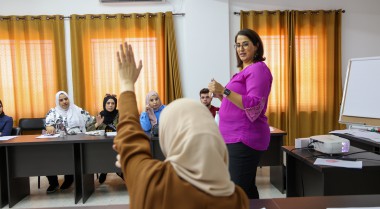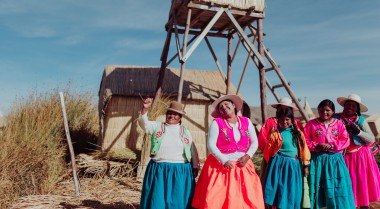
Women, Peace and Security in Palestine: Peace starts and lasts with women’s participation
The Palestinian Centre for Peace and Democracy works for an inclusive and peaceful future through projects that aim to include Palestinian youth and women in the political system. Currently, the Centre is working on the "Young Women and Men engaging in Peace Negotiations within the framework of UN Resolution 1325" project. They hope to contribute to increasing the representation of Palestinian women in peace processes and decision-making. The project will empower young women to participate in peace negotiations and in the internal Palestinian reconciliation process.
Where does a peace process without the meaningful involvement of women lead? To no lasting peace, as it is the case in Palestine, which has been in conflict with Israel since the mid-20th century. Women must be represented in all spaces where decisions are being made, including peace negotiations. In 2000, this was formally acknowledged by the United Nations with the adoption of the landmark Security Council Resolution 1325 on Women, Peace and Security (UNSC Resolution 1325). The resolution reaffirms the crucial role of women in peace negotiations and stresses the importance of their increased participation and full involvement in all stages of peace processes. However, this commitment has yet to become a reality for women in Palestine as they remain excluded from political and peace processes.
The exclusion of women from decision-making spaces: Three causes
At the Palestinian Centre for Peace and Democracy, we have identified three main factors contributing to Palestinian women's oppression: First, living under Israeli occupation, including the separation between Gaza and the West Bank, second the dominating patriarchal structures in the Palestinian society, and lastly, the systematic exclusion from peace and reconciliation processes. However, where there is a determination for change, there is hope. With the support of the United Nations Women's Peace and Humanitarian Fund's Rapid Response Window (WPHF RRW), we are on a mission to empower young Palestinian women to become agents of change in peace negotiations and in internal reconciliation.
The roots of exclusion: The gendered impact of Israeli occupation
The 2000 Intifada, the uprising against the Israeli occupation, led to continuous Israeli military operations. The gendered impact on Palestinian women and girls of decades of destruction is horrendous. For instance, it increases poverty that, in turn, triggers greater gender-based violence against them. Further, the gender-unequal environment exacerbates patriarchal structures, cultivating a breeding ground for clans and tribes to take over power as citizens’ trust in the government dwindles. In a society where the rule of tribes prevails over the rule of law, prejudices against women also lead to their inevitable exclusion from decision-making in both local and major political and social matters.
No peace without women: The repeated failures of peace negotiations
Palestinian women's systematic exclusion from decision-making spaces and the Israeli–Palestinian peace process is evident in recent history. The 1991 Madrid Conference and the Oslo Peace Accords in 1993 and 1995 sought to bring peace between Palestine and Israel. During these peace negotiations, however, only one woman, Dr. Hanan Ashrawi, was present. These conferences were unsuccessful in bringing sustainable peace to Palestine, one of the reasons being the absence of women from the negotiations.
In the meantime, following what many Palestinian people hoped to be a democratic election for Palestine in 2006, the spiral of violence continued unabated. The elections resulted in an escalation of the tensions between the two major Palestinian parties, the Islamist party Hamas and the national movement Fatah. In the attempts made to foster reconciliation between the two opposing sides, women were once again left out. Regrettably, it seemed that their suffering throughout the internal crisis did not matter.
The path towards a long-lasting peace in Palestine: Empowering women
For decades, each attempt to end the conflict has failed. It is clear that if women are denied a seat at the negotiation table, peace will remain a distant dream. Women must be included in the decision-making processes, not only because they make up over half of the population in our country but also because it is their right to make decisions with regard to their lives. It is paramount that the peace negotiations, whether they are direct or indirect between Palestine and Israel continue soon and meaningfully include women. We will never break free from the chains of occupation, overcome the Fatah-Hamas divide, and the patriarchal structures of our society as long as Palestinian women are denied participation in local and national peace and political process and are therefore excluded from major political decisions.
The support provided by the WPHF RRW now gives us the opportunity to finally uplift women’s voices and allow them to take their rightful place within the peace processes. To make this happen, the UNSC Resolution 1325 must be implemented in Palestine. We, at the Palestinian Center for Peace and Democracy, have decided to take up this challenge. By advocating for the inclusion of Palestinian youth and women in the political system, we are determined to advance their representation in the peace and decision-making processes. To achieve this, we are now offering capacity-strengthening workshops for young women and men to support their engagement in meaningful dialogues with politicians and decision-makers. Working together with the youth, we empower and encourage them to become active agents in both peace negotiations and internal Palestinian reconciliation processes. We strongly believe in the ability of Palestinian women to be crucial agents of change. Now more than ever, Palestine needs its women leaders to guide the country towards long-lasting peace.

